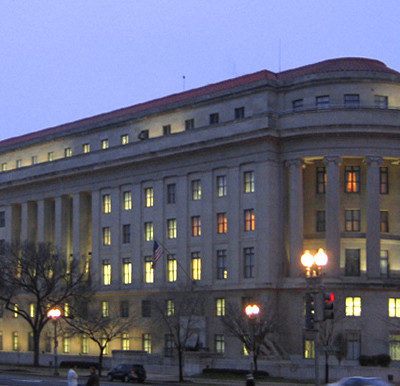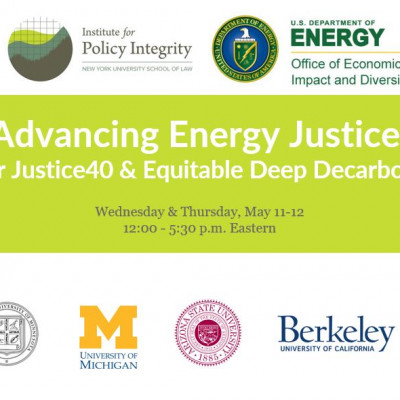May 31, 2022
May 2022 at Policy Integrity
- Advancing a Just Energy Transition
- Policy Integrity Research Helps Spur a Novel Climate Bill in New York
- Social Cost of Carbon: SCOTUS Decision, Amicus Brief, and “Office Hours” for States
- How EPA Can Strengthen its New Truck Emissions Rule
- How the FTC Can Limit Unwanted Charges and Data Retention
- In the News
-
Advancing a Just Energy Transition
Policy Integrity and the Department of Energy cohosted a two-day conference that brought together federal agency staff working to implement the Justice40 initiative with researchers to discuss how academic research can be more responsive to communities’ needs. Over 600 speakers and attendees worked to identify implementation challenges and opportunities for Justice40 and other energy justice initiatives. The goal of the conference was to enable researchers to develop methods, interdisciplinary connections, and frameworks that can help make deep decarbonization efforts more consistent with the tenets of energy justice. A video playlist of conference events is available, along with panelists' slides.
We also hosted “Is the Price Right? Valuing and Compensating Distributed Energy Resources,” the final webinar in a series highlighting research funded by the Alfred P. Sloan Foundation in the electricity transmission and distribution space. The recording is available here.
-

Policy Integrity Research Helps Spur a Novel Climate Bill in New York
In May, New York state legislators introduced the Climate Change Superfund Act, which would establish a climate change adaptation cost recovery program by requiring the fossil fuel companies most responsible for climate damages to pay $30 billion to the state over 10 years. The money would be invested in infrastructure for climate resilience, including building sea walls, improving storm drainage, fortifying the power grid, and installing air conditioning in public buildings such as schools.
Dr. Rachel Rothschild, Legal Fellow at the Institute for Policy Integrity and incoming Assistant Professor at the University of Michigan Law School, conducted legal research that served as a foundation for the proposed legislation. Rothschild gave remarks on the legal and policy dimensions of the bill at a recent press conference and to Inside EPA. The program is based on the on the longstanding legal doctrine known as the “polluter-pays” principle, which stipulates that the entities responsible for pollution should be financially liable for the resulting harms. Rothschild’s research is now being compiled into a publication.
-

Social Cost of Carbon: SCOTUS Decision, Amicus Brief, and “Office Hours” for States
After a district court enjoined federal use of the social cost of greenhouse gas metrics, the Fifth Circuit stayed the injunction. Last week, the Supreme Court kept the stay in place as the litigation proceeds. We filed an amicus brief to the Fifth Circuit explaining that the federal government’s climate-damage valuations are based on voluminous and expert science, and that using those valuations in policymaking follows regulatory guidance and precedent. Max Sarinsky spoke to E&E News on how the stay affected Biden policies.
Policy Integrity has also been active in supporting the use of the SC-GHG at the state level. This month, Iliana Paul and Justin Gundlach held our first “office hours” with states in the U.S. Climate Alliance; the participants posed technical questions about applying the SC-GHG in different contexts.
-

How EPA Can Strengthen its New Truck Emissions Rule
In March 2022, EPA proposed standards to regulate emissions of nitrogen oxides and particulate matter from heavy-duty vehicles beginning with Model Year 2027. Policy Integrity submitted comments recommending that EPA strengthen these crucial standards to fulfill its statutory duty to set standards "reflecting the greatest degree of emission reduction achievable." We also made a number of recommendations designed to ensure that EPA properly compares regulatory alternatives and accounts for the benefits of strong regulation. While EPA’s regulatory impact analysis showed—for the first time, as Meredith Hankins noted to Inside EPA—how the benefits of its proposed rule would accrue to vulnerable subpopulations, we also made recommendations designed to strengthen the agency’s analysis to better reflect distributional outcomes. The overall net benefits for society under these rules are quite high, so critics looking to take future standards to court will likely face an “uphill battle,” Hankins told Bloomberg Law.
-

How the FTC Can Limit Unwanted Charges and Data Retention
Our new report argues that the Federal Trade Commission (FTC) should take action to end “immortal accounts,” a phenomenon by which entities make it difficult or impossible to delete a consumer account in order to retain and profit from the user’s data and continue charging subscriptions. The report argues that an FTC rule requiring reasonable cancellation practices for all market actors and providing clear and specific guidelines would address the harms of immortal accounts, which waste consumers’ time and money. Such regulation would fall under the FTC’s authority and advance the Commission’s mission to protect consumers and competition by preventing deceptive, unfair, and anticompetitive business practices.
-

In the News
In May, the Securities and Exchange Commission (SEC) voted to advance stricter requirements regarding the names of environmental, social and governance (ESG) funds and the disclosures such funds make to their investors. “This rulemaking should be embraced by ESG critics and boosters alike,” Jack Lienke told E&E News. “Those who think ESG investing is all surface and no substance should welcome the Commission’s effort to provide investors in ‘green’ or ‘socially responsible’ funds with clear and comparable information about where their dollars are going and why. And those who think ESG investing is a reliable means of maximizing long-term returns, should welcome this effort to expose greenwashing and increase investor confidence in legitimate ESG claims and products.”
Also this month, Richard Revesz gave a keynote address at the Environmental and Energy Policy and the Economy Conference of the National Bureau of Economics Research. He spoke about the legal issues surrounding the use of the Social Cost of Greenhouse Gases in government decisionmaking and outlined steps to reduce the legal risks.

